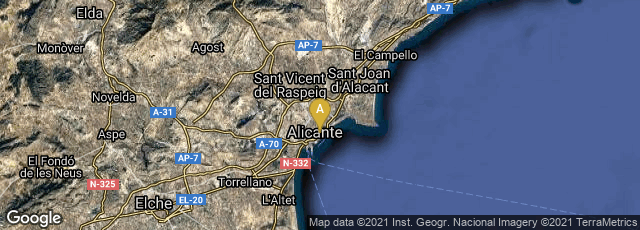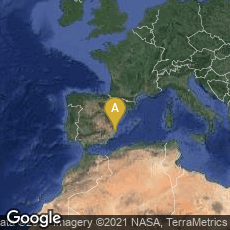

A: Alicante (Alacant), Comunidad Valenciana, Spain
Readers of this database will have observed that entries tend to focus on "firsts" of various kinds. This entry describes a very special kind of first: the discovery of the earliest dated human feces, and conclusions drawn from their analysis.
On June 25, 2014 Ainara Sistiaga, a PhD student at the University of La Laguna on the Canary Islands, and colleagues, reported that Neanderthal feces collected from the remnants of a campfire dating to about 48,000 BCE at the El Salt archaeological site near Alicante on Spain's Mediterranean coast, contained traces of digested vegetables as well as meat. Prior to this find the only evidence that Neanderthals might have eaten meat was plant matter found in the dental tartar of Neanderthals—some of it cooked and some of it medicinal.
Sitiaga, Mailol, Galván, Summons, "The Neanderthal Meal: A New Perspective Using Faecal Biomarkers," PLOS | ONE. DOI:10.1371/journal.pone.0101045
"Neanderthal dietary reconstructions have, to date, been based on indirect evidence and may underestimate the significance of plants as a food source. While zooarchaeological and stable isotope data have conveyed an image of Neanderthals as largely carnivorous, studies on dental calculus and scattered palaeobotanical evidence suggest some degree of contribution of plants to their diet. However, both views remain plausible and there is no categorical indication of an omnivorous diet. Here we present direct evidence of Neanderthal diet using faecal biomarkers, a valuable analytical tool for identifying dietary provenance. Our gas chromatography-mass spectrometry results from El Salt (Spain), a Middle Palaeolithic site dating to ca. 50,000 yr. BP, represents the oldest positive identification of human faecal matter. We show that Neanderthals, like anatomically modern humans, have a high rate of conversion of cholesterol to coprostanol related to the presence of required bacteria in their guts. Analysis of five sediment samples from different occupation floors suggests that Neanderthals predominantly consumed meat, as indicated by high coprostanol proportions, but also had significant plant intake, as shown by the presence of 5β-stigmastanol. This study highlights the applicability of the biomarker approach in Pleistocene contexts as a provider of direct palaeodietary information and supports the opportunity for further research into cholesterol metabolism throughout human evolution" (Abstract).
Webb, Jonathan, "Oldest human faeces show Neanderthals ate vegetables," BBC.com/news/science-environment-27981702.